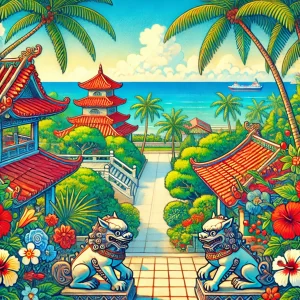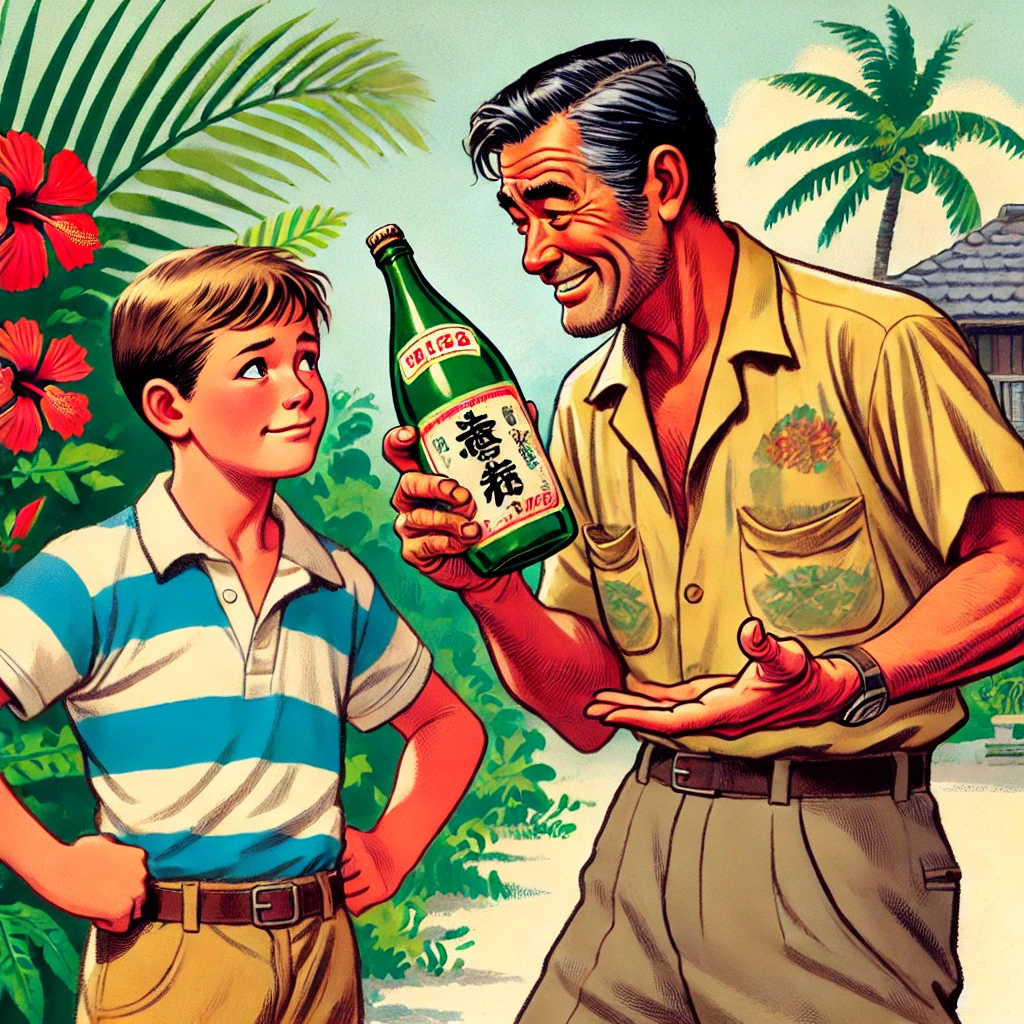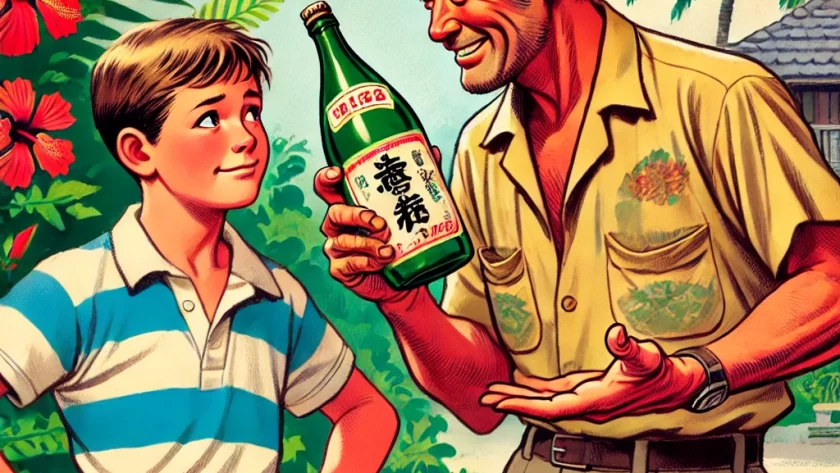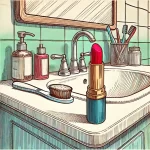ハイサイおじさん [Haisai Ojisan]
喜納昌吉 [KINA Shōkichi]
Words & Music : 喜納昌吉 [KINA Shōkichi]
“Haisai Ojisan” is a famous song full of Okinawan elements. Let me start by giving a brief introduction to Okinawa Prefecture.
Okinawa is a region of islands located map far south of Japan’s main islands, Hokkaido, Honshu, Shikoku, and Kyushu. It is famous for its warm climate, beautiful seas, and is one of Japan’s top tourist destinations. The religion, culture, and cuisine in Okinawa differ greatly from other parts of Japan. I feel that the people here are bright, kind, and not overly concerned with minor details.

During World War II, Okinawa was the only place in Japan where fierce ground battles took place, resulting in the loss of one in four of its residents. After the war, Okinawa was placed under U.S. control and remained so from 1945 until 1971, when it was returned to Japan.
Okinawa also has a strong dialect. Originally, they spoke Ryukyuan languages that shares roots with Japanese, but the two languages are as different as English and German. These days, there aren’t many who speak Ryukyuan languages daily, and most people in Okinawa now use a mix language of standard Japanese, Ryukyuan languages, and English.
Okinawans have a deep love for music, and they have a traditional musical style. Okinawan music often uses a scale made up of five notes: do, mi, fa, so, and si, creating a very bright and cheerful atmosphere. In Okinawan-style pop music, an additional note, re, is often used, creating a six-note scale. One of the key instruments in this style is the “三線 / sanshin wiki“, a three-stringed instrument made from snakeskin, believed to have come from China in the 14th or 15th century. For the people of Okinawa, the sanshin is a cherished instrument, holding a special place in their hearts.
“Haisai Ojisan” is a representative song of Shōkichi Kina, a musician from Okinawa, and his band. The song uses traditional Okinawan rhythms and scales. Kina composed the song when he was thirteen years old, drawing from personal experiences for the lyrics.
- おじさん [ojisan] : uncle
“おじさん / Ojisan” means uncle, but in general, it refers to a middle-aged man. This is standard Japanese.
“ハイサイ / haisai” is an Okinawan word meaning something like “hello.”
The song’s story revolves around a boy (played by Shōkichi Kina) talking to a middle-aged man (played by a female vocalist) from his neighborhood, starting with the greeting, “Haisai, Ojisan.” The character of the man is based on a real person, and it is said that the boy in the song represents Kina himself.
Since the lyrics are mainly in the Ryūkyū language, as someone who is not from Okinawa, I actually find it difficult to understand most of them. I’ve done my best to provide translations based on reference materials. The pronunciation is also different from standard Japanese, so it’s best to listen to the music.
ハイサイおじさん ハイサイおじさん
haisai ojisan haisai ojisan
昨夜ぬ三合ビン小残とんな
yūbi nu sangō bin gwā nukutonna
残とら我んに分きらんな
nukutora wan ni wakiranna
(translation) “Hello, uncle, hello, uncle,
Did you have some of that three gō (540ml) bottle left from last night?
If you do, could you share it with me?”
Here’s the boy’s line. Next is the man’s response.
ありあり童いぇー童
ari ari warabā iē warabā
三合ビンぬあたいし我んにんかい
sangō bin nu ataishi wan ninkai
残とんで言ゆんないぇー童
nukutonde iyunna iē warabā
(translation) “Oh, oh, kid! Hey, kid!
Are you telling me there’s still some left in that three gō (540ml) bottle for me? Hey, kid!”
あんせおじさん
anse ojisan
三合ビンし不足やみせぇーら
sangō bin shi fuzuku yamiserā
一升ビン我んに呉みせーみ
isshō bin wan ni kuimisēmi
(translation) “Well then, uncle,
If a three gō (540ml) bottle isn’t enough, could you give me a full one shō (1800ml) bottle?”
The conversation continues in this manner. This is the first verse, and there are five in total.

ハイサイおじさん ハイサイおじさん
haisai ojisan haisai ojisan
年頃なたくと 妻小ふさぬ
tushigurū natakuto tumugwā fusa nu
うんじゅが汝ん子や 呉みそうらに
unju ga yaran gwā ya kuimisōrani
(translation) “Hello, uncle, hello, uncle,
I’ve come of age, and I want to take a wife.
Could you give me your daughter?”
ありーあり童 いぇー童
ari ari warabā iē warabā
汝や童ぬ くさぶっくいて
ya warabā nu kusabukkuitē
妻小とめゆんな いぇー童
tumugwā tumeyunna iē warabā
(translation) “Oh, oh, kid! Hey, kid!
You’re still just a child, acting so grown-up.
You say you want a wife? Hey, kid!”
あんせおじさん
anse ojisan
二十や余て三十過ぎて
nijū ya watē sanjū sugite
白髪かみてから 妻とめゆみ
shiraga kamite kara tumutomeyumi
(translation) “Well then, uncle,
Will you wait until you’re past thirty and gray-haired
before you finally get a wife?”
ハイサイおじさん ハイサイおじさん
haisai ojisan haisai ojisan
おじさんカンパチ まぎさよい
ojisan kanpachi magi sayoi
みーみじカンパチ 台湾はぎ
mīmiji kanpachi Taiwan hagi
(translation) “Hello, uncle, hello, uncle,
Uncle, your bald head is quite something,
It’s like a big old earthworm bald patch, or a Taiwan bald patch.”
ありあり童 いぇー童
ari ari warabā iē warabā
頭んはぎとし 出来やーど
chiburun hagitoshi dekiyādo
我ったー元祖ん むる出来やー
wattā gwansu-n muru dekiyā
(translation) “Oh, oh, kid! Hey, kid!
You say I’m bald, but that’s how a great man is.
All my ancestors were great men, too!”
あんせおじさん
anse ojisan
我んにん整形しみやーい
wan nin seikei shimiyāi
あまくまカンパチ 植いゆがや
amakuma kanpachi iiyugaya
(translation) “Well then, uncle,
Why don’t you give me some plastic surgery too,
So I can plant hair all over like those bald patches?”
ハイサイおじさん ハイサイおじさん
haisai ojisan haisai ojisan
おじさんヒジ小ぬ をかさよい
ojisan hijigwā nu wokasayoi
天井ぬいぇんちゅぬ ヒジどやる
tenjō nu ienchu nu hiji doyaru
(translation) “Hello, uncle, hello, uncle,
Uncle, your beard is quite a sight,
It’s like a rat hanging from the ceiling!”
ありあり童 いぇー童
ari ari warabā iē warabā
汝やヒジヒジ笑ゆしが
ya hiji hiji warayushiga
ヒジ小ぬあしがる むてゆんど
hijigwā nu ashigaru muteyundo
(translation) “Oh, oh, kid! Hey, kid!
You laugh at my beard, but
a man with a beard is to be respected.”
あんせんおじさん
ansen ojisan
我んにん負きらん明日から
wan nin makiran acha kara
いぇんちゅぬヒジ小 立てゆがや
ienchu nu hijigwā tateyugaya
(translation) “Well then, uncle,
I won’t lose either. Starting tomorrow,
I’ll grow a rat’s beard too!”
ハイサイおじさん ハイサイおじさん
haisai ojisan haisai ojisan
昨日ぬ女郎小ぬ 香ばさよい
chinū nu jurigwā nu kawabasayoi
うんじゅん一度 めんそーれー
unjun ichido mensōrē
(translation) “Hello, uncle, hello, uncle,
The courtesan from last night was quite alluring.
Why don’t you come join me at least once?”
“めんそーれ / mensōrē” is the only word in the lyrics that I know in the Ryūkyū language. It means “welcome.” If you travel to Okinawa, you will likely be greeted with this word.
ありあり童 いぇー童
ari ari warabā iē warabā
辻、中島、渡地とぅ
tsuji nakashima watanji tū
おじさんやあまぬ 株主ど
ojisan ya aman nu kabunushi do
(translation) “Oh, oh, kid! Hey, kid!
In Tsuji, Nakashima, and Watanji,
I am a shareholder of that place.”
あんせんおじさん
ansen ojisan
毎日あまにくまとーて
mēnichi ama ni kumatōte
我んねー貧乏や たきちきゆみ
wan nē hinsū ya takichikiyumi
(translation) “Well then, uncle,
I’ve been hanging out at that place every day,
That’s why I’ve ended up so poor!”
The song was first recorded in 1969 on an album by Shōkichi’s father, Shōei Kina, who was a folk singer. Later, in 1972, it was released as a single under the name “Shōkichi Kina and Kina Champloose,” and became a massive hit. By the way, it seems that Champloose is derived from the Okinawan dish “chanpurū wiki“.
In 1977, the song gained nationwide recognition after being included in the album Shōkichi Kina & Champloose, which sparked a boom in Okinawan music across Japan.
This song played a major role in popularizing Okinawan pop and influenced other musicians, including Makoto Kubota and Haruomi Hosono.
Today, “Haisai Ojisan” is known as an iconic Okinawan song, often played as a cheer song for Okinawan teams in high school baseball. It has become a staple of Okinawan folk culture.
Reference for lyrics:
https://taru.ti-da.net/e734031.html
YouTube Search “Haisai Ojisan – Shoukichi Kina”
Thanks for reading! Feel free to comment if you have any feedback or questions.
Follow me on X.



